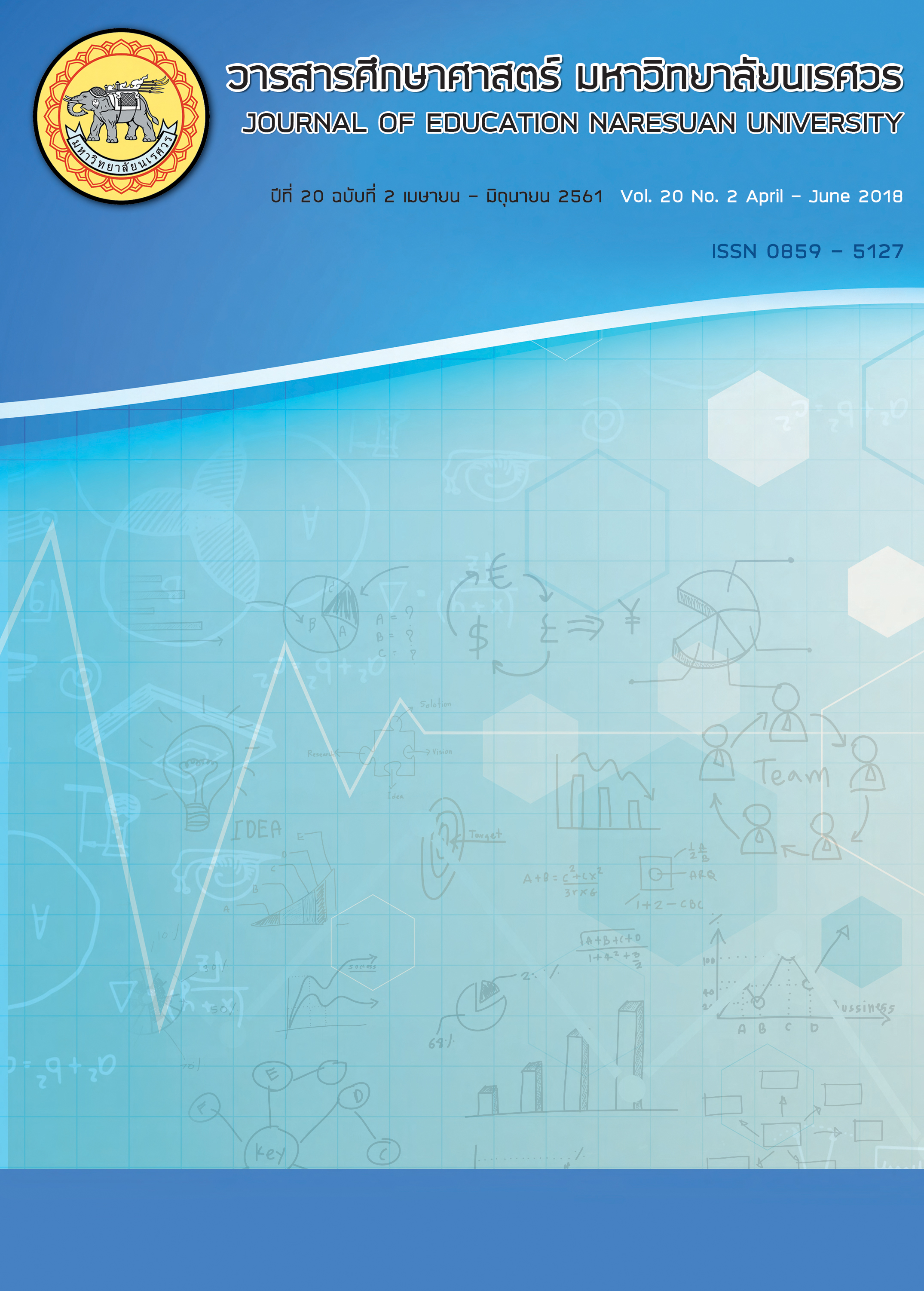การพัฒนากิจกรรมการเรียนรู้ตามแนวคิดสุนทรียสนทนาเพื่อส่งเสริมพฤติกรรมประชาธิปไตยด้านคารวธรรม สำหรับนักเรียนชั้นมัธยมศึกษาปีที่ 2; DEVELOPMENT OF LEARNING ACTIVITIES BASED ON DIALOGUE TO ENHANCE DEMOCRATIC BEHAVIORS ...
Main Article Content
Abstract
การวิจัยครั้งนี้มีจุดมุ่งหมาย 1) เพื่อสร้างและหาดัชนีประสิทธิผลของกิจกรรมการเรียนรู้ ตามแนวคิดสุนทรียสนทนา 2) เพื่อศึกษาผลการใช้กิจกรรมการเรียนรู้ตามแนวคิดสุนทรียสนทนา โดย 2.1) ศึกษาพฤติกรรมประชาธิปไตยด้านคารวธรรมของนักเรียนชั้นมัธยมศึกษาปีที่ 2 2.2) เปรียบเทียบพฤติกรรมประชาธิปไตยด้านคารวธรรมหลังเรียนกับเกณฑ์ร้อยละ 80 ดำเนินการโดยใช้กระบวนการวิจัยและพัฒนา เป็น 2 ขั้นตอน ดังนี้ ขั้นตอนที่ 1 ขั้นสร้างและหาดัชนีประสิทธิผลของกิจกรรมการเรียนรู้ ผู้วิจัยดำเนินการสร้างกิจกรรมการเรียนรู้ตามแนวคิดสุนทรียสนทนา 4 ขั้นตอน คือ 1) ขั้นสร้างความสนใจและฟังอย่างลึกซึ้ง 2) ขั้นการนำเสนอด้วยหลักการเคารพ 3) ขั้นฝึกปฏิบัติด้วยการห้อยแขวน และ 4 ขั้นการสื่อสารด้วยเสียงของเรา จำนวน 12 ชั่วโมง ให้ผู้เชี่ยวชาญจำนวน 5 ท่าน ตรวจสอบความเหมาะสมของกิจกรรมการเรียนรู้และแผนการจัดการเรียนรู้ จากนั้นนำไปทดลองใช้กับนักเรียนชั้นมัธยมศึกษาปีที่ 2 เพื่อหาดัชนีประสิทธิผล เครื่องมือที่ได้ได้แก่ กิจกรรมการเรียนรู้และแผนการเรียนรู้ แบบประเมินความเหมาะสมของกิจกรรมการเรียนรู้และแผนการเรียนรู้ แบบสังเกตพฤติกรรมประชาธิปไตยด้านคารวธรรม ขั้นตอนที่ 2 การทดลองใช้กิจกรรมการเรียนรู้ กลุ่มตัวอย่างเป็นนักเรียนโรงเรียนวัดจันทร์ตะวันออก ภาคเรียนที่ 2 ปีการศึกษา 2558 จำนวน 40 คน ซึ่งได้มาจากการเลือกแบบเจาะจง แบบแผนการวิจัย คือ One Group Pretest-Posttest Design สถิติในการวิเคราะห์ข้อมูล คือ ค่าเฉลี่ย ค่าส่วนเบี่ยงเบนมาตรฐาน และค่าทีแบบไม่เป็นอิสระต่อกัน ผลการวิจัย พบว่า
1. กิจกรรมการเรียนรู้ตามแนวคิดสุนทรียสนทนา เพื่อส่งเสริมพฤติกรรมประชาธิปไตยด้านคารวธรรม สำหรับนักเรียนชั้นมัธยมศึกษาปีที่ 2 โดยผู้เชี่ยวชาญ ประเมินว่ากิจกรรมการเรียนรู้ตามแนวคิดสุนทรียสนทนา มีความเหมาะสมระดับมาก (= 4.34, S.D. = 0.66) และแผนการจัดการเรียนรู้ตามแนวคิดสุนทรียสนทนา มีความเหมาะสมในระดับมากที่สุด (
= 4.62, S.D. = 0.54) และเมื่อนำไปทดลองใช้กับกลุ่มทดลอง พบว่า กิจกรรมการเรียนรู้ตามแนวคิดสุนทรียสนทนา มีดัชนีประสิทธิผล เท่ากับ 0.5573 แสดงถึงกิจกรรมการเรียนรู้ที่พัฒนาขึ้นทำให้เกิดความก้าวหน้าในการส่งเสริมพฤติกรรมประชาธิปไตยด้านคารวธรรม คิดเป็นร้อยละ 55.73
2. การศึกษาผลการใช้กิจกรรมการเรียนรู้ พบว่า
2.1 พฤติกรรมประชาธิปไตยด้านคารวธรรมของนักเรียนชั้นมัธยมศึกษาปีที่ 2 หลังเรียนด้วยกิจกรรมการเรียนรู้ตามแนวคิดสุนทรียสนทนาในภาพรวมมีการปฏิบัติบ่อย ( = 4.30, S.D. = 0.37) โดยด้านการเคารพสิทธิของผู้อื่นมีค่าเฉลี่ยการปฏิบัติสูงสุด (
= 4.34, S.D. = 0.45)
2.2 พฤติกรรมประชาธิปไตยด้านคารวธรรมของนักเรียนชั้นมัธยมศึกษาปีที่ 2 หลังเรียนด้วยกิจกรรมการเรียนรู้ตามแนวคดสุนทรียสนทนาสูงกว่าเกณฑ์ร้อยละ 80 อย่างมีนัยสำคัญทางสถิติที่ระดับ .05
DEVELOPMENT OF LEARNING ACTIVITIES BASED ON DIALOGUE TO ENHANCE DEMOCRATIC BEHAVIORS ON RESPECTIVE ETHICS FOR GRADE VIII STUDENTS
The purposes of this research were 1) to construct and find the effectiveness Index of leaning activities based on dialogue to enhance democratic behaviors on respective ethics of grade VII students, and 2) to study the results of using learning activities based on dialogue as followed: 2.1) study the competency of enhance democratic behaviors on respective ethics for grade VIII students, and 2.2) compare the competency of enhance democratic behaviors on respective ethics after and efficiency criteria 80. The were two steps of research and development as follows. The first step was developing and finding the effectiveness Index of leaning activities based on dialogue contain with four steps 1; The attention and deep listening. Step 2; Presentation material and respecting. Step 3; Practicing and suspending. Step 4; Voicing. The researcher created learning activities for 12 hours. Development and evaluation of their suitability by five experts and then activities were used with grade VII students to find the Index of the effectiveness. The research instrument were leaning activities based on dialogue to enhance democratic behaviors on respective ethics. Behavior recorded observation. The second step implementing learning activities based on dialogue. The example groups of this research, employed by purposive sampling, was 40 grade VII students, Watjantawanook School who was studying semester 2, academic year 2015. One Group Pretest–Posttest Design. The statistics used for data analysis were the mean, the standard deviation, and t – test dependent. The results were as follows:
1. Learning activities based on dialogue to enhance democratic behaviors on respective ethics of grade VII students. The evaluation by experts showed that this activities were suitable at high level ( = 4.34, S.D. = 0.66), learning activity based on authentic learning plans were suitable after highest level (
= 4.62, S.D. = 0.54). When using the activities with the sample group, it found the learning activities based on dialogue had the Index effectiveness of the ability as 0.5573 represents learning activities developed to make progress to enhance democratic behaviors on respective ethics percentage which accounted for 55.73.
2. The results of the study of using the developed learning activities were:
2.1 Democratic behaviors on respective ethics for grade VIII students after learning activities based on dialogue. Overall, a practice frequently ( = 4.30, S.D. = 0.37) by respect for the rights of other had the highest (
= 4.34, S.D. = 0.45)
2.2 Democratic behaviors on respective ethics for grade VIII students after learning activities based on dialogue were higher criteria percentage, which accounted for 80 with the activities at the level of .05.
Article Details
The owner of the article does not copy or violate any of its copyright. If any copyright infringement occurs or prosecution, in any case, the Editorial Board is not involved in all the rights to the owner of the article to be performed.
References
Dangkird, W. (2012). The study of democratic in Mathayomsuksa III the secondary educational service area office 2 the assessment standard of education round 2 (Master thesis). Bangkok: Srinakharinwirot University. (in Thai)
Disathaporn, C. (2011). Development of a non-formal education activity model based on bohm’s dialogue and nonviolent communication to enhance intra-familial communication ability of drug rehabilitation youth’s parents (Doctoral dissertation). Bangkok: Chulalongkorn University. (in Thai)
Kitrakarn, P., & Pattiyathani, S. (2002). Effectiveness Index: E.I. Journal of educational measurement Mahasarakham University, 8, 32-36. (in Thai)
Ministry of Education. (2008). The Basic Education Core Curriculum B.E. 2551 (A.D. 2008). Bangkok: The Agricultural Cooperative Federation of Thailand. (in Thai)
Office of the National Primary Education. (1997). A handbook of teaching and learning in developing democracy in school. Bangkok: Kurusapa Printing Ladphrao. (in Thai)
Pinitjitsamut, M. (2009). Dialogue: science of creating wisdom in human. Samut Prakan: Jong Raroen Offset. (in Thai)
Rodchueajeen, M. (2011). A research and development of learning activities plans on social studies, religion and culture subject group for life skills development of lower secondary school students: an application of dialogue data collection technique (Doctoral dissertation). Bangkok: Chulalongkorn University. (in Thai)
Semahasarn, A., et al. (2009). Social Buddhism and cultural Grade 5 (3rd ed.). Bangkok: Aksorn Charoenthat. (in Thai)
Srisa-ard, B. (2002). Basic Research (7th ed.). Bangkok: Suweeriyasan. (in Thai)
Suwanarpa, S. (2011). Teaching document in a subject of learning system. Nonthaburi: Sukhothai Thammathirat Open University. (in Thai)
Suwannabuppa, P. (2010). A handbook of organizing dialogue. Nakhon Pathom: The Institute of Human Rights and Peace Studies (IHRP). (in Thai)
Wangwinyu, W. (2009). Dialogue (2nd ed.). Bangkok: Offset Creation. (in Thai)


